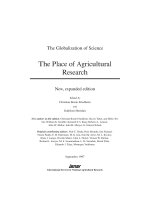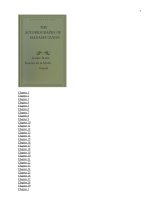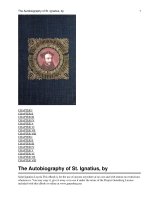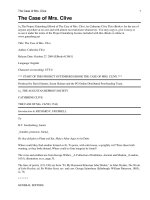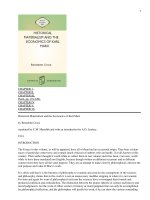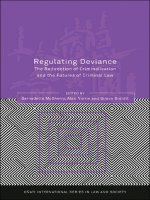The Island of Doctor Moreau ppt
Bạn đang xem bản rút gọn của tài liệu. Xem và tải ngay bản đầy đủ của tài liệu tại đây (660.93 KB, 171 trang )
Download free eBooks of classic literature, books and
novels at Planet eBook. Subscribe to our free eBooks blog
and email newsletter.
The Island of
Doctor Moreau
By H. G. Wells
T I D M
INTRODUCTION.
O
N February the First 1887, the Lady Vain was lost by
collision with a derelict when about the latitude 1’ S.
and longitude 107’ W.
On January the Fih, 1888—that is eleven months and
four days aer— my uncle, Edward Prendick, a private gen-
tleman, who certainly went aboard the Lady Vain at Callao,
and who had been considered drowned, was picked up in
latitude 5’ 3’ S. and longitude 101’ W. in a small open boat of
which the name was illegible, but which is supposed to have
belonged to the missing schooner Ipecacuanha. He gave
such a strange account of himself that he was supposed de-
mented. Subsequently he alleged that his mind was a blank
from the moment of his escape from the Lady Vain. His case
was discussed among psychologists at the time as a curious
instance of the lapse of memory consequent upon physi-
cal and mental stress. e following narrative was found
among his papers by the undersigned, his nephew and heir,
but unaccompanied by any denite request for publication.
e only island known to exist in the region in which
my uncle was picked up is Noble’s Isle, a small volcanic islet
and uninhabited. It was visited in 1891 by H. M. S. Scorpi-
on. A party of sailors then landed, but found nothing living
thereon except certain curious white moths, some hogs and
rabbits, and some rather peculiar rats. So that this narra-
F B P B.
tive is without conrmation in its most essential particular.
With that understood, there seems no harm in putting this
strange story before the public in accordance, as I believe,
with my uncle’s intentions. ere is at least this much in its
behalf: my uncle passed out of human knowledge about lat-
itude 5’ S. and longitude 105’ E., and reappeared in the same
part of the ocean aer a space of eleven months. In some
way he must have lived during the interval. And it seems
that a schooner called the Ipecacuanha with a drunken cap-
tain, John Davies, did start from Africa with a puma and
certain other animals aboard in January, 1887, that the ves-
sel was well known at several ports in the South Pacic, and
that it nally disappeared from those seas (with a consider-
able amount of copra aboard), sailing to its unknown fate
from Bayna in December, 1887, a date that tallies entirely
with my uncle’s story.
CHARLES EDWARD PRENDICK.
(e Story written by Edward Prendick.)
T I D M
I. IN THE DINGEY OF
THE ‘LADY VAIN.’
I
DO not propose to add anything to what has already
been written concerning the loss of the ‘Lady Vain.’ As
everyone knows, she collided with a derelict when ten days
out from Callao. e longboat, with seven of the crew, was
picked up eighteen days aer by H. M. gunboat ‘Myrtle,’
and the story of their terrible privations has become quite
as well known as the far more horrible ‘Medusa’ case. But
I have to add to the published story of the ‘Lady Vain’ an-
other, possibly as horrible and far stranger. It has hitherto
been supposed that the four men who were in the dingey
perished, but this is incorrect. I have the best of evidence for
this assertion: I was one of the four men.
But in the rst place I must state that there never were
four men in the dingey,—the number was three. Constans,
who was ‘seen by the captain to jump into the gig,’* luck-
ily for us and unluckily for himself did not reach us. He
came down out of the tangle of ropes under the stays of
the smashed bowsprit, some small rope caught his heel as
he let go, and he hung for a moment head downward, and
then fell and struck a block or spar oating in the water. We
pulled towards him, but he never came up.
F B P B.
* Daily News, March 17, 1887.
I say lucky for us he did not reach us, and I might almost
say luckily for himself; for we had only a small breaker of
water and some soddened ship’s biscuits with us, so sudden
had been the alarm, so unprepared the ship for any disas-
ter. We thought the people on the launch would be better
provisioned (though it seems they were not), and we tried
to hail them. ey could not have heard us, and the next
morning when the drizzle cleared,— which was not until
past midday,—we could see nothing of them. We could not
stand up to look about us, because of the pitching of the
boat. e two other men who had escaped so far with me
were a man named Helmar, a passenger like myself, and a
seaman whose name I don’t know,— a short sturdy man,
with a stammer.
We dried famishing, and, aer our water had come to
an end, tormented by an intolerable thirst, for eight days
altogether. Aer the second day the sea subsided slowly to
a glassy calm. It is quite impossible for the ordinary reader
to imagine those eight days. He has not, luckily for himself,
anything in his memory to imagine with. Aer the rst day
we said little to one another, and lay in our places in the
boat and stared at the horizon, or watched, with eyes that
grew larger and more haggard every day, the misery and
weakness gaining upon our companions. e sun became
pitiless. e water ended on the fourth day, and we were
already thinking strange things and saying them with our
eyes; but it was, I think, the sixth before Helmar gave voice
T I D M
to the thing we had all been thinking. I remember our voic-
es were dry and thin, so that we bent towards one another
and spared our words. I stood out against it with all my
might, was rather for scuttling the boat and perishing to-
gether among the sharks that followed us; but when Helmar
said that if his proposal was accepted we should have drink,
the sailor came round to him.
I would not draw lots however, and in the night the sail-
or whispered to Helmar again and again, and I sat in the
bows with my clasp-knife in my hand, though I doubt if
I had the stu in me to ght; and in the morning I agreed
to Helmar’s proposal, and we handed halfpence to nd the
odd man. e lot fell upon the sailor; but he was the stron-
gest of us and would not abide by it, and attacked Helmar
with his hands. ey grappled together and almost stood
up. I crawled along the boat to them, intending to help
Helmar by grasping the sailor’s leg; but the sailor stumbled
with the swaying of the boat, and the two fell upon the gun-
wale and rolled overboard together. ey sank like stones. I
remember laughing at that, and wondering why I laughed.
e laugh caught me suddenly like a thing from without.
I lay across one of the thwarts for I know not how long,
thinking that if I had the strength I would drink sea-water
and madden myself to die quickly. And even as I lay there
I saw, with no more interest than if it had been a picture, a
sail come up towards me over the sky-line. My mind must
have been wandering, and yet I remember all that hap-
pened, quite distinctly. I remember how my head swayed
with the seas, and the horizon with the sail above it danced
F B P B.
up and down; but I also remember as distinctly that I had a
persuasion that I was dead, and that I thought what a jest it
was that they should come too late by such a little to catch
me in my body.
For an endless period, as it seemed to me, I lay with my
head on the thwart watching the schooner (she was a lit-
tle ship, schooner-rigged fore and a) come up out of the
sea. She kept tacking to and fro in a widening compass,
for she was sailing dead into the wind. It never entered my
head to attempt to attract attention, and I do not remember
anything distinctly aer the sight of her side until I found
myself in a little cabin a. ere’s a dim half-memory of be-
ing lied up to the gangway, and of a big red countenance
covered with freckles and surrounded with red hair staring
at me over the bulwarks. I also had a disconnected impres-
sion of a dark face, with extraordinary eyes, close to mine;
but that I thought was a nightmare, until I met it again. I
fancy I recollect some stu being poured in between my
teeth; and that is all.
T I D M
II. THE MAN WHO WAS
GOING NOWHERE
T
HE cabin in which I found myself was small and rather
untidy. A youngish man with axen hair, a bristly straw-
coloured moustache, and a dropping nether lip, was sitting
and holding my wrist. For a minute we stared at each other
without speaking. He had watery grey eyes, oddly void of
expression. en just overhead came a sound like an iron
bedstead being knocked about, and the low angry growling
of some large animal. At the same time the man spoke. He
repeated his question,—‘How do you feel now?’
I think I said I felt all right. I could not recollect how I
had got there. He must have seen the question in my face,
for my voice was inaccessible to me.
‘You were picked up in a boat, starving. e name on the
boat was the ‘Lady Vain,’ and there were spots of blood on
the gunwale.’
At the same time my eye caught my hand, thin so that it
looked like a dirty skin-purse full of loose bones, and all the
business of the boat came back to me.
‘Have some of this,’ said he, and gave me a dose of some
scarlet stu, iced.
It tasted like blood, and made me feel stronger.
‘You were in luck,’ said he, ‘to get picked up by a ship with
F B P B.
a medical man aboard.’ He spoke with a slobbering articu-
lation, with the ghost of a lisp.
‘What ship is this?’ I said slowly, hoarse from my long
silence.
‘It’s a little trader from Arica and Callao. I never asked
where she came from in the beginning,—out of the land of
born fools, I guess. I’m a passenger myself, from Arica. e
silly ass who owns her,—he’s captain too, named Davies,—
he’s lost his certicate, or something. You know the kind of
man,— calls the thing the ‘Ipecacuanha,’ of all silly, infer-
nal names; though when there’s much of a sea without any
wind, she certainly acts according.’
(en the noise overhead began again, a snarling growl
and the voice of a human being together. en another
voice, telling some ‘Heaven-forsaken idiot’ to desist.)
‘You were nearly dead,’ said my interlocutor. ‘It was a very
near thing, indeed. But I’ve put some stu into you now.
Notice your arm’s sore? Injections. You’ve been insensible
for nearly thirty hours.’
I thought slowly. (I was distracted now by the yelping of
a number of dogs.) ‘Am I eligible for solid food?’ I asked.
‘anks to me,’ he said. ‘Even now the mutton is boiling.’
‘Yes,’ I said with assurance; ‘I could eat some mutton.’
‘But,’ said he with a momentary hesitation, ‘you know
I’m dying to hear of how you came to be alone in that boat.
Damn that howling!’ I thought I detected a certain suspi-
cion in his eyes.
He suddenly le the cabin, and I heard him in violent
controversy with some one, who seemed to me to talk gib-
T I D M
berish in response to him. e matter sounded as though it
ended in blows, but in that I thought my ears were mistaken.
en he shouted at the dogs, and returned to the cabin.
‘Well?’ said he in the doorway. ‘You were just beginning
to tell me.’
I told him my name, Edward Prendick, and how I had
taken to Natural History as a relief from the dulness of my
comfortable independence.
He seemed interested in this. ‘I’ve done some science
myself. I did my Biology at University College,—getting out
the ovary of the earthworm and the radula of the snail, and
all that. Lord! It’s ten years ago. But go on! go on! tell me
about the boat.’
He was evidently satised with the frankness of my story,
which I told in concise sentences enough, for I felt horribly
weak; and when it was nished he reverted at once to the
topic of Natural History and his own biological studies. He
began to question me closely about Tottenham Court Road
and Gower Street. ‘Is Caplatzi still ourishing? What a shop
that was!’ He had evidently been a very ordinary medical
student, and dried incontinently to the topic of the music
halls. He told me some anecdotes.
‘Le it all,’ he said, ‘ten years ago. How jolly it all used to
be! But I made a young ass of myself,—played myself out
before I was twenty-one. I daresay it’s all dierent now. But
I must look up that ass of a cook, and see what he’s done to
your mutton.’
e growling overhead was renewed, so suddenly and
with so much savage anger that it startled me. ‘What’s that?’
F B P B.
I called aer him, but the door had closed. He came back
again with the boiled mutton, and I was so excited by the
appetising smell of it that I forgot the noise of the beast that
had troubled me.
Aer a day of alternate sleep and feeding I was so far re-
covered as to be able to get from my bunk to the scuttle, and
see the green seas trying to keep pace with us. I judged the
schooner was running before the wind. Montgomery—that
was the name of the axen-haired man— came in again as
I stood there, and I asked him for some clothes. He lent me
some duck things of his own, for those I had worn in the
boat had been thrown overboard. ey were rather loose
for me, for he was large and long in his limbs. He told me
casually that the captain was three-parts drunk in his own
cabin. As I assumed the clothes, I began asking him some
questions about the destination of the ship. He said the ship
was bound to Hawaii, but that it had to land him rst.
‘Where?’ said I.
‘It’s an island, where I live. So far as I know, it hasn’t got
a name.’
He stared at me with his nether lip dropping, and looked
so wilfully stupid of a sudden that it came into my head that
he desired to avoid my questions. I had the discretion to ask
no more.
T I D M
III. THE STRANGE FACE.
W
E le the cabin and found a man at the companion
obstructing our way. He was standing on the ladder
with his back to us, peering over the combing of the hatch-
way. He was, I could see, a misshapen man, short, broad,
and clumsy, with a crooked back, a hairy neck, and a head
sunk between his shoulders. He was dressed in dark-blue
serge, and had peculiarly thick, coarse, black hair. I heard
the unseen dogs growl furiously, and forthwith he ducked
back,— coming into contact with the hand I put out to fend
him o from myself. He turned with animal swiness.
In some indenable way the black face thus ashed upon
me shocked me profoundly. It was a singularly deformed
one. e facial part projected, forming something dim-
ly suggestive of a muzzle, and the huge half-open mouth
showed as big white teeth as I had ever seen in a human
mouth. His eyes were blood-shot at the edges, with scarcely
a rim of white round the hazel pupils. ere was a curious
glow of excitement in his face.
‘Confound you!’ said Montgomery. ‘Why the devil don’t
you get out of the way?’
e black-faced man started aside without a word. I went
on up the companion, staring at him instinctively as I did
so. Montgomery stayed at the foot for a moment. ‘You have
no business here, you know,’ he said in a deliberate tone.
F B P B.
‘Your place is forward.’
e black-faced man cowered. ‘ey—won’t have me for-
ward.’ He spoke slowly, with a queer, hoarse quality in his
voice.
‘Won’t have you forward!’ said Montgomery, in a menac-
ing voice. ‘But I tell you to go!’ He was on the brink of saying
something further, then looked up at me suddenly and fol-
lowed me up the ladder.
I had paused half way through the hatchway, looking
back, still astonished beyond measure at the grotesque ug-
liness of this black-faced creature. I had never beheld such
a repulsive and extraordinary face before, and yet—if the
contradiction is credible—I experienced at the same time
an odd feeling that in some way I had already encountered
exactly the features and gestures that now amazed me. Af-
terwards it occurred to me that probably I had seen him as
I was lied aboard; and yet that scarcely satised my suspi-
cion of a previous acquaintance. Yet how one could have set
eyes on so singular a face and yet have forgotten the precise
occasion, passed my imagination.
Montgomery’s movement to follow me released my at-
tention, and I turned and looked about me at the ush deck
of the little schooner. I was already half prepared by the
sounds I had heard for what I saw. Certainly I never be-
held a deck so dirty. It was littered with scraps of carrot,
shreds of green stu, and indescribable lth. Fastened by
chains to the mainmast were a number of grisly staghounds,
who now began leaping and barking at me, and by the miz-
zen a huge puma was cramped in a little iron cage far too
T I D M
small even to give it turning room. Farther under the star-
board bulwark were some big hutches containing a number
of rabbits, and a solitary llama was squeezed in a mere box
of a cage forward. e dogs were muzzled by leather straps.
e only human being on deck was a gaunt and silent sailor
at the wheel.
e patched and dirty spankers were tense before the
wind, and up alo the little ship seemed carrying every sail
she had. e sky was clear, the sun midway down the west-
ern sky; long waves, capped by the breeze with froth, were
running with us. We went past the steersman to the ta-
rail, and saw the water come foaming under the stern and
the bubbles go dancing and vanishing in her wake. I turned
and surveyed the unsavoury length of the ship.
‘Is this an ocean menagerie?’ said I.
‘Looks like it,’ said Montgomery.
‘What are these beasts for? Merchandise, curios? Does
the captain think he is going to sell them somewhere in the
South Seas?’
‘It looks like it, doesn’t it?’ said Montgomery, and turned
towards the wake again.
Suddenly we heard a yelp and a volley of furious blas-
phemy from the companion hatchway, and the deformed
man with the black face came up hurriedly. He was imme-
diately followed by a heavy red-haired man in a white cap.
At the sight of the former the staghounds, who had all tired
of barking at me by this time, became furiously excited,
howling and leaping against their chains. e black hesi-
tated before them, and this gave the red-haired man time to
F B P B.
come up with him and deliver a tremendous blow between
the shoulder-blades. e poor devil went down like a felled
ox, and rolled in the dirt among the furiously excited dogs.
It was lucky for him that they were muzzled. e red-haired
man gave a yawp of exultation and stood staggering, and
as it seemed to me in serious danger of either going back-
wards down the companion hatchway or forwards upon his
victim.
So soon as the second man had appeared, Montgomery
had started forward. ‘Steady on there!’ he cried, in a tone of
remonstrance. A couple of sailors appeared on the forecas-
tle. e black-faced man, howling in a singular voice rolled
about under the feet of the dogs. No one attempted to help
him. e brutes did their best to worry him, butting their
muzzles at him. ere was a quick dance of their lithe grey-
gured bodies over the clumsy, prostrate gure. e sailors
forward shouted, as though it was admirable sport. Mont-
gomery gave an angry exclamation, and went striding down
the deck, and I followed him. e black-faced man scram-
bled up and staggered forward, going and leaning over the
bulwark by the main shrouds, where he remained, panting
and glaring over his shoulder at the dogs. e red-haired
man laughed a satised laugh.
‘Look here, Captain,’ said Montgomery, with his lisp a
little accentuated, gripping the elbows of the red-haired
man, ‘this won’t do!’
I stood behind Montgomery. e captain came half
round, and regarded him with the dull and solemn eyes of
a drunken man. ‘Wha’ won’t do?’ he said, and added, af-
T I D M
ter looking sleepily into Montgomery’s face for a minute,
‘Blasted Sawbones!’
With a sudden movement he shook his arm free, and af-
ter two ineectual attempts stuck his freckled sts into his
side pockets.
‘at man’s a passenger,’ said Montgomery. ‘I’d advise
you to keep your hands o him.’
‘Go to hell!’ said the captain, loudly. He suddenly turned
and staggered towards the side. ‘Do what I like on my own
ship,’ he said.
I think Montgomery might have le him then, seeing the
brute was drunk; but he only turned a shade paler, and fol-
lowed the captain to the bulwarks.
‘Look you here, Captain,’ he said; ‘that man of mine is
not to be ill-treated. He has been hazed ever since he came
aboard.’
For a minute, alcoholic fumes kept the captain speech-
less. ‘Blasted Sawbones!’ was all he considered necessary.
I could see that Montgomery had one of those slow, per-
tinacious tempers that will warm day aer day to a white
heat, and never again cool to forgiveness; and I saw too
that this quarrel had been some time growing. ‘e man’s
drunk,’ said I, perhaps ociously; ‘you’ll do no good.’
Montgomery gave an ugly twist to his dropping lip. ‘He’s
always drunk. Do you think that excuses his assaulting his
passengers?’
‘My ship,’ began the captain, waving his hand unsteadily
towards the cages, ‘was a clean ship. Look at it now!’ It was
certainly anything but clean. ‘Crew,’ continued the captain,
F B P B.
‘clean, respectable crew.’
‘You agreed to take the beasts.’
‘I wish I’d never set eyes on your infernal island. What
the devil— want beasts for on an island like that? en,
that man of yours— understood he was a man. He’s a luna-
tic; and he hadn’t no business a. Do you think the whole
damned ship belongs to you?’
‘Your sailors began to haze the poor devil as soon as he
came aboard.’
‘at’s just what he is—he’s a devil! an ugly devil! My
men can’t stand him. I can’t stand him. None of us can’t
stand him. Nor you either!’
Montgomery turned away. ‘You leave that man alone,
anyhow,’ he said, nodding his head as he spoke.
But the captain meant to quarrel now. He raised his voice.
‘If he comes this end of the ship again I’ll cut his insides out,
I tell you. Cut out his blasted insides! Who are you, to tell
me what I’m to do? I tell you I’m captain of this ship,—cap-
tain and owner. I’m the law here, I tell you,—the law and
the prophets. I bargained to take a man and his attendant to
and from Arica, and bring back some animals. I never bar-
gained to carry a mad devil and a silly Sawbones, a—‘
Well, never mind what he called Montgomery. I saw the
latter take a step forward, and interposed. ‘He’s drunk,’ said
I. e captain began some abuse even fouler than the last.
‘Shut up!’ I said, turning on him sharply, for I had seen dan-
ger in Montgomery’s white face. With that I brought the
downpour on myself.
However, I was glad to avert what was uncommonly near
T I D M
a scue, even at the price of the captain’s drunken ill-will. I
do not think I have ever heard quite so much vile language
come in a continuous stream from any man’s lips before,
though I have frequented eccentric company enough. I
found some of it hard to endure, though I am a mild-tem-
pered man; but, certainly, when I told the captain to ‘shut
up’ I had forgotten that I was merely a bit of human otsam,
cut o from my resources and with my fare unpaid; a mere
casual dependant on the bounty, or speculative enterprise,
of the ship. He reminded me of it with considerable vigour;
but at any rate I prevented a ght.
F B P B.
IV. AT THE
SCHOONER’S RAIL.
T
HAT night land was sighted aer sundown, and the
schooner hove to. Montgomery intimated that was his
destination. It was too far to see any details; it seemed to
me then simply a low-lying patch of dim blue in the uncer-
tain blue-grey sea. An almost vertical streak of smoke went
up from it into the sky. e captain was not on deck when
it was sighted. Aer he had vented his wrath on me he had
staggered below, and I understand he went to sleep on the
oor of his own cabin. e mate practically assumed the
command. He was the gaunt, taciturn individual we had
seen at the wheel. Apparently he was in an evil temper with
Montgomery. He took not the slightest notice of either of
us. We dined with him in a sulky silence, aer a few inef-
fectual eorts on my part to talk. It struck me too that the
men regarded my companion and his animals in a singu-
larly unfriendly manner. I found Montgomery very reticent
about his purpose with these creatures, and about his desti-
nation; and though I was sensible of a growing curiosity as
to both, I did not press him.
We remained talking on the quarter deck until the sky
was thick with stars. Except for an occasional sound in the
yellow-lit forecastle and a movement of the animals now
T I D M
and then, the night was very still. e puma lay crouched
together, watching us with shining eyes, a black heap in
the corner of its cage. Montgomery produced some cigars.
He talked to me of London in a tone of half-painful remi-
niscence, asking all kinds of questions about changes that
had taken place. He spoke like a man who had loved his life
there, and had been suddenly and irrevocably cut o from
it. I gossiped as well as I could of this and that. All the time
the strangeness of him was shaping itself in my mind; and
as I talked I peered at his odd, pallid face in the dim light
of the binnacle lantern behind me. en I looked out at the
darkling sea, where in the dimness his little island was hid-
den.
is man, it seemed to me, had come out of Immensity
merely to save my life. To-morrow he would drop over the
side, and vanish again out of my existence. Even had it been
under commonplace circumstances, it would have made me
a trie thoughtful; but in the rst place was the singulari-
ty of an educated man living on this unknown little island,
and coupled with that the extraordinary nature of his lug-
gage. I found myself repeating the captain’s question, What
did he want with the beasts? Why, too, had he pretended
they were not his when I had remarked about them at rst?
en, again, in his personal attendant there was a bizarre
quality which had impressed me profoundly. ese circum-
stances threw a haze of mystery round the man. ey laid
hold of my imagination, and hampered my tongue.
Towards midnight our talk of London died away, and
we stood side by side leaning over the bulwarks and staring
F B P B.
dreamily over the silent, starlit sea, each pursuing his own
thoughts. It was the atmosphere for sentiment, and I began
upon my gratitude.
‘If I may say it,’ said I, aer a time, ‘you have saved my
life.’
‘Chance,’ he answered. ‘Just chance.’
‘I prefer to make my thanks to the accessible agent.’
‘ank no one. You had the need, and I had the knowl-
edge; and I injected and fed you much as I might have
collected a specimen. I was bored and wanted something
to do. If I’d been jaded that day, or hadn’t liked your face,
well—it’s a curious question where you would have been
now!’
is damped my mood a little. ‘At any rate,’ I began.
‘It’s chance, I tell you,’ he interrupted, ‘as everything is
in a man’s life. Only the asses won’t see it! Why am I here
now, an outcast from civilisation, instead of being a happy
man enjoying all the pleasures of London? Simply because
eleven years ago— I lost my head for ten minutes on a foggy
night.’
He stopped. ‘Yes?’ said I.
‘at’s all.’
We relapsed into silence. Presently he laughed. ‘ere’s
something in this starlight that loosens one’s tongue. I’m an
ass, and yet somehow I would like to tell you.’
‘Whatever you tell me, you may rely upon my keeping to
myself— if that’s it.’
He was on the point of beginning, and then shook his
head, doubtfully.
T I D M
‘Don’t,’ said I. ‘It is all the same to me. Aer all, it is better
to keep your secret. ere’s nothing gained but a little relief
if I respect your condence. If I don’t—well?’
He grunted undecidedly. I felt I had him at a disadvan-
tage, had caught him in the mood of indiscretion; and to tell
the truth I was not curious to learn what might have driven
a young medical student out of London. I have an imagina-
tion. I shrugged my shoulders and turned away. Over the
tarail leant a silent black gure, watching the stars. It was
Montgomery’s strange attendant. It looked over its shoulder
quickly with my movement, then looked away again.
It may seem a little thing to you, perhaps, but it came like
a sudden blow to me. e only light near us was a lantern
at the wheel. e creature’s face was turned for one brief
instant out of the dimness of the stern towards this illumi-
nation, and I saw that the eyes that glanced at me shone with
a pale-green light. I did not know then that a reddish lumi-
nosity, at least, is not uncommon in human eyes. e thing
came to me as stark inhumanity. at black gure with its
eyes of re struck down through all my adult thoughts and
feelings, and for a moment the forgotten horrors of child-
hood came back to my mind. en the eect passed as it
had come. An uncouth black gure of a man, a gure of no
particular import, hung over the tarail against the star-
light, and I found Montgomery was speaking to me.
‘I’m thinking of turning in, then,’ said he, ‘if you’ve had
enough of this.’
I answered him incongruously. We went below, and he
wished me good-night at the door of my cabin.
F B P B.
at night I had some very unpleasant dreams. e wan-
ing moon rose late. Its light struck a ghostly white beam
across my cabin, and made an ominous shape on the plank-
ing by my bunk. en the staghounds woke, and began
howling and baying; so that I dreamt tfully, and scarcely
slept until the approach of dawn.
T I D M
V. THE MAN WHO HAD
NOWHERE TO GO.
I
N the early morning (it was the second morning aer
my recovery, and I believe the fourth aer I was picked
up), I awoke through an avenue of tumultuous dreams,—
dreams of guns and howling mobs,—and became sensible
of a hoarse shouting above me. I rubbed my eyes and lay
listening to the noise, doubtful for a little while of my
whereabouts. en came a sudden pattering of bare feet, the
sound of heavy objects being thrown about, a violent creak-
ing and the rattling of chains. I heard the swish of the water
as the ship was suddenly brought round, and a foamy yel-
low-green wave ew across the little round window and le
it streaming. I jumped into my clothes and went on deck.
As I came up the ladder I saw against the ushed sky—
for the sun was just rising—the broad back and red hair of
the captain, and over his shoulder the puma spinning from
a tackle rigged on to the mizzen spanker-boom.
e poor brute seemed horribly scared, and crouched in
the bottom of its little cage.
‘Overboard with ‘em!’ bawled the captain. ‘Overboard
with ‘em! We’ll have a clean ship soon of the whole bilin’
of ‘em.’
He stood in my way, so that I had perforce to tap his
F B P B.
shoulder to come on deck. He came round with a start, and
staggered back a few paces to stare at me. It needed no ex-
pert eye to tell that the man was still drunk.
‘Hullo!’ said he, stupidly; and then with a light coming
into his eyes, ‘Why, it’s Mister—Mister?’
‘Prendick,’ said I.
‘Pendick be damned!’ said he. ‘Shut-up,—that’s your
name. Mister Shut-up.’
It was no good answering the brute; but I certainly did
not expect his next move. He held out his hand to the gang-
way by which Montgomery stood talking to a massive
grey-haired man in dirty-blue annels, who had apparently
just come aboard.
‘at way, Mister Blasted Shut-up! that way!’ roared the
captain.
Montgomery and his companion turned as he spoke.
‘What do you mean?’ I said.
‘at way, Mister Blasted Shut-up,—that’s what I mean!
Overboard, Mister Shut-up,—and sharp! We’re cleaning the
ship out,— cleaning the whole blessed ship out; and over-
board you go!’
I stared at him dumfounded. en it occurred to me that
it was exactly the thing I wanted. e lost prospect of a jour-
ney as sole passenger with this quarrelsome sot was not one
to mourn over. I turned towards Montgomery.
‘Can’t have you,’ said Montgomery’s companion, con-
cisely.
‘You can’t have me!’ said I, aghast. He had the squarest
and most resolute face I ever set eyes upon.

